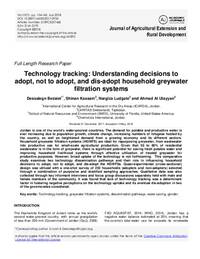Technology tracking: Understanding decisions to adopt, not to adopt, and dis-adopt household greywater filtration systems

Authors:
Jordan is one of the world’s water-poorest countries. The demand for potable and productive water is ever increasing due to population growth, climate change, increasing numbers of refugees hosted by the country, as well as heightened demand from a growing economy and its different sectors. Household greywater filtration systems (HGWFS) are ideal for repurposing greywater, from wastewater into productive use for small-scale agricultural production. Given that 50 to 80% of residential wastewater is in the form of greywater, there is significant potential for saving fresh potable water and improving household livelihood systems through effective utilization of treated greywater for productive purposes. However, broad uptake of the technology is not forthcoming. This comparative study examines two technology dissemination pathways and their role in influencing household decisions to adopt, not to adopt, and dis-adopt the HGWFSs. Quasi-experimental (cross-sectional) design was utilized with a one-shot survey of 252 households (adopters and non-adopters) selected through a combination of purposive and stratified sampling approaches. Qualitative data was also collected through key informant interviews and focus group discussions separately held with male and female members of the community. It was found that lack of technology tracking was a determinant factor in fostering negative perceptions on the technology up-take and its eventual dis-adoption in two of the governorates considered.
